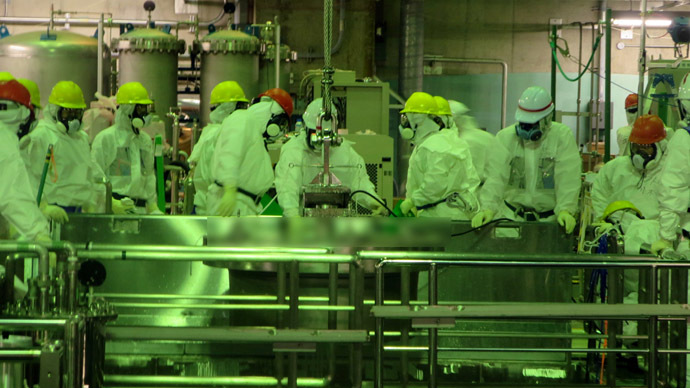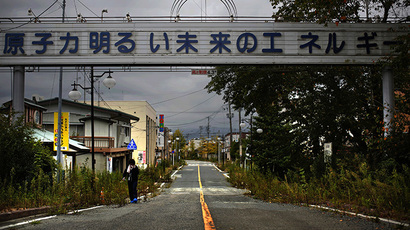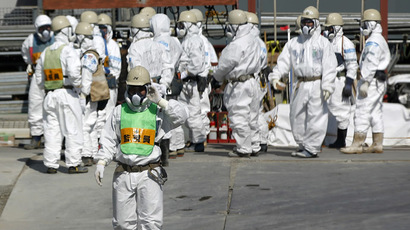Japan to spend $970mn on storing radioactive Fukushima soil

Tokyo is looking to invest 100 billion yen ($970 million) for storing more than 130,000 tons of contaminated soil dug out near the crippled Fukushima nuclear power plant, according to local media. No nearby town has offered its land for the plan, though.
The Japanese government wants to buy some 3 to 5 square kilometers (1.2 to 2 square miles) of land near Fukushima to build a storage facility, reports the Asahi Shimbun, a national daily.
This land must be close to the plant where the radioactive soil was collected as part of decontamination efforts, and so the government is reportedly evaluating three towns – those ones closest and most heavily affected by the March 2011 nuclear disaster.
The Japanese environment minister, Nobuteru Ishiara, will discuss the government’s plan with local officials from the towns of Futaba, Okuma and Naraha this weekend, the report says.
However, both the mayors of the towns and the governor of Fukushima prefecture are concerned about the idea of storing kilotons of radioactive soil for at least 30 years. The available figure, as of the end of August, is 132,738 tons of contaminated soil, collected mainly from Fukushima prefecture. All this waste is currently being stored at various facilities nationwide, which are reportedly reaching the limits of their capacity.
But even this staggering figure may be the tip of an iceberg, according to earlier reports by the Asahi Shimbun, which exposed “crooked” clean-up practices like the dumping of contaminated leaves and debris into rivers by workers, who were complying with orders from their supervisors.
Claiming that decontamination work rules set by the Environment Ministry have been “regularly and blatantly ignored,” a team of the daily’s journalists also quoted some of the workers as saying they were ordered to clean the ground properly only around sites where measurements were taken.
The chaotic organization of the clean-up process, with the owner of the crippled plant, TEPCO, relying on numerous subcontractors for hiring workers, has also been exposed in the recent revelations of construction worker turned whistleblower, Tetsuya Hayashi.
Hayashi’s allegations, contained in an investigative report by Reuters, include stories of total negligence regarding the rights and safety of the clean-up workers operating in a hazardous radioactive environment. Hayashi also claimed that he was cheated and had his records falsified, while a third of his promised wages vanished, which eventually led to his decision to sue TEPCO.
TEPCO has long been denying such claims, saying that they are “doing everything to ensure that workers operate in safe conditions” and “deal harshly with law-violating subcontractors.”
But TEPCO’s general manager for nuclear power, Masayuki Ono,
admitted to Reuters that they are unable to check every contract
of their subcontractor companies “based on the cost needed to
carry out a task”.
Meanwhile, Japanese Prime Minister Shinzo Abe recently received
a call from coalition parties urging him to admit that the
ambitious decontamination program is not working as expected, and
that many of the evacuated people may never return to their homes
in the area.
A large zone around the Fukushima Daiichi nuclear power plant was evacuated in the weeks after the March 2011 disaster, when a severe earthquake followed by a tsunami caused a catastrophe and sparked reactor meltdowns.














